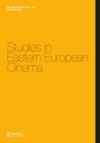看不见的镜头:关于1914年萨拉热窝暗杀的未制作的合拍片的反帝国主义和反殖民主义方面
IF 0.4
0 FILM, RADIO, TELEVISION
引用次数: 0
摘要
本文以波斯尼亚和黑塞哥维那档案馆的资料为基础,研究了萨拉热窝工作室波斯尼亚电影公司战后试图联合制作一部关于奥地利弗朗茨·斐迪南大公和索菲·霍恩伯格公爵夫人遇刺的电影。南斯拉夫电影人庆祝年轻的波斯尼亚抵抗奥匈帝国主义和殖民主义的同时,官方谴责暗杀者的“恐怖主义”。我调查了南斯拉夫如何面对其合作伙伴据称对南斯拉夫生产资源的剥削以及倾向于对历史进行叙事修改的倾向,以吸引更多的国际观众。波士那电影公司的合作案例表明,记忆制作、社会主义国家建设、国际文化推广和可持续商业发展之间的平衡并不稳定。本文章由计算机程序翻译,如有差异,请以英文原文为准。
The unseen shots: anti-imperialist and anti-colonialist aspects of unmade co-productions about the 1914 Sarajevo Assassination
Abstract Based on sources found in the Archive of Bosnia and Herzegovina, this article examines Sarajevo studio Bosna Film’s postwar attempts to co-produce a film about the assassination of the Archduke Franz Ferdinand of Austria and Duchess Sophie Hohenberg. Yugoslav filmmakers’ celebration of Young Bosnia’s resistance to Austro-Hungarian imperialism and colonialism is juxtaposed to the official condemnation of the assassins’ ‘terrorism’. I investigate how the Yugoslavs confronted their partners’ purported exploitation of Yugoslav production resources and inclination toward narrative modifications of history as promising to attract a larger international audience. Examples of Bosna Film’s collaborations demonstrate the uneasy balance between memory production, socialist state-building, international cultural promotion and sustainable business development.
求助全文
通过发布文献求助,成功后即可免费获取论文全文。
去求助
来源期刊

Studies in Eastern European Cinema
Arts and Humanities-Visual Arts and Performing Arts
CiteScore
0.50
自引率
0.00%
发文量
34
 求助内容:
求助内容: 应助结果提醒方式:
应助结果提醒方式:


